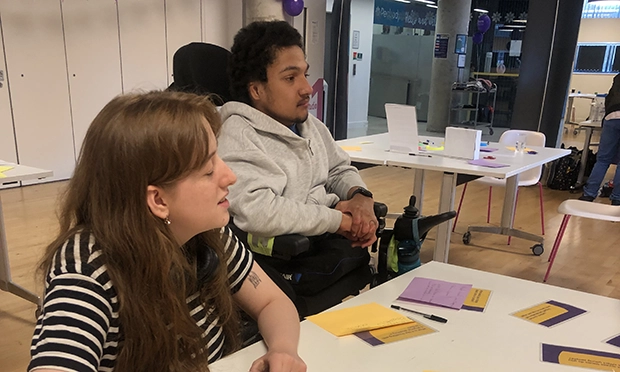‘Change in attitude’ needed to improve accessibility on London’s transport network, campaigners warn

Larli Davies and Joel Sprouse at the forum in Hackney
A “change in attitude” is needed to tackle accessibility problems on London’s transport system, campaigners have warned.
At a recent forum in Dalston, a group of people with disabilities outlined a range of issues they face when navigating the capital.
These include not being allowed on to buses, missing Tube stops because of a lack of help in getting off, and not being told quickly enough about major obstacles such as broken lifts.
The meeting at Pembury Community Centre was organised by Sonny Auty, a member of the Transport for London (TfL) Youth Panel, with support from charity Scope.
Attendee Larli Davies, 20, said she takes four buses a day but “about one in six doesn’t let me on”.
“The wheelchair space is usually taken up by a pram or sometimes a trolley, or sometimes the ramp isn’t working,” she explained.
Under Transport for London (TfL) policy, priority is supposed to be given to wheelchair users because “it is the only place they can travel safely”.
Forum participants also discussed some of the impending changes to the transport network, such as wheelchair spaces on Central and Bakerloo line trains and next year’s arrival of DLR trains with “improved accessibility”.
Davies said the changes “should have happened 20 years ago”.
“This is not a new movement,” she added. “We’ve known that disabled people exist for a long time.”
Auty said he only knows about the new measures “because I’m interested in transport”.
Gaby Clements, youth community engagement office at Scope, said a lack of communication about changes is a longstanding problem, adding: “Information needs to be up to date. For example, if a lift is broken and the access isn’t there that day, it might be that people leave the house and then get to the station and can’t travel.”

Joel said fighting for better accessibility can be ‘isolating’. Photograph: Joel Sprouse
Attendees reserved their most pointed criticisms for the Tube and trains operated by National Rail services.
Joel Sprouse, 20, said: “Travelling on any mode of transport can be hit and miss, but on some modes there are more misses than hits.
“A couple of times I’ve ended up at the end of a line because there was no-one there to help me off.”
TfL said its network now has 200 step-free stations, including 92 Tube and 62 Overground stations and all DLR and Elizabeth line stations and tram stops.
But Davies said: “I can’t use the tube. It’s not that I can’t use the Tube comfortably, I still can’t use two-thirds of stations.”
She is forced to set off earlier than most “because a 40-minute train ride is around an hour and a half for me”.
Mark Evers, TfL’s chief customer officer, said: “Making our transport network more accessible and inclusive is a top priority for us, as we know that a more accessible public transport network benefits everyone.
“TfL has one of the most accessible bus networks in the world. All bus routes are served by low-floor vehicles with an access ramp and dedicated space for wheelchair users.
“By law, wheelchair users have priority over the space over buggy users and our bus drivers are trained to remind customers of this.
“We are working to improve accessibility on the Tube network using responses to our recent step-free access consultation to shape our short-term work and our long-term goals where funding is available.”
Both Davies and Sprouse welcomed the forum.
“You feel like ‘I’m not the only one who is fighting this battle’,” Sprouse said. “There are people who have the exact same troubles as me.”
He added: “As a disabled person, fighting for what you need can be quite isolating.”
Auty and Scope are hoping to organise more meetings in the future.
Clements said: “We’ve had a lot of interest, and people are keen to have hybrid meetings so some can join online.”
To find out more about the accessible transport forum or Scope’s community engagement in London, contact Gaby Clements at gaby.clements@scope.org.uk.
For more information about Scope’s work, visit scope.org.uk.
